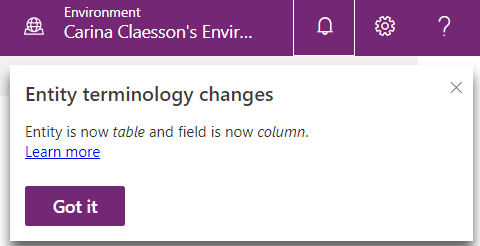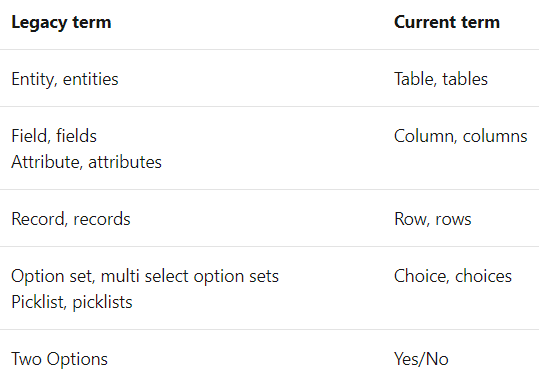Microsoft Dataverse, former Common Data Service (CDS), is the data source we have as back-end for our model-driven Power Apps and in some cases also for our Canvas Power Apps. Wait a minute, former CDS? Let’s take a step back and talk about CDS. CDS has been our cloud version of xRM, our database in the cloud, the home of our entities (tables nowadays – read on and you’ll get it) but also much more than that. Security management, different techniques for creating business logic and data import are some concepts which have been included too.
All of this is still here, but from now on – it is not called CDS anymore. Now we say goodbye to CDS and hello to Microsoft Dataverse! Don’t worry, it is just a name change, nothing more than that. Just so you know – CDM (Common Data Model) will still be CDM.
In July this year Microsoft introduced Project Oakdale and with that parts of the Power Platform moved into Microsoft Teams. Read the announcement here. Project Oakdale was just a temporarily name though and we have curiously been waiting for the announcement of the long term name. The wait is finally over – say hello to Microsoft Dataverse for Teams!
Announcement on the Power Apps blog – the new names and Microsoft Dataverse for Teams is now general available! The names are already updated in Microsoft Docs as well: Microsoft Dataverse and Microsoft Dataverse for Teams.
Microsoft Dataverse and Microsoft Dataverse for Teams
Say it out loud and get used to it! Microsoft Dataverse – I like it! At first it made me think of data and reverse as well as data and verse, verse as in a poem. Then someone mentioned what was totally obvious – a universe of data!

No matter what we call it – Dataverse, CDS, xRM – it is still the powerful data source which is so much more than just a data source. I am glad we have a long term name for the ”lite” version now though and I like the the consistency in Microsoft Dataverse and Microsoft Dataverse for Teams.
CDS was easy to say “in Swedish” – The CDS was translated (in daily talk) to ”CDS’en” and the letters were pronounced in Swedish. Dataverse – we’ll probably stick to the English version, some might pronounce data in different ways though. Go and listen to Megan and Lisa as they talk about pronouncing data. Data as in… another old name that we have already forgotten about!
More terminology changes within Microsoft Dataverse (former CDS)
Today we have met with Microsoft Dataverse and I like this new name already! Lately there has been more changes related to Microsoft Dataverse and terminology. In case anyone missed it – we must not only say goodbye to CDS, but also to Entity/Entities, Field/Fields, Attribute/Attributes, Record/Records, Option Set/Option Sets and Two option/Two options.
Perhaps you have noticed an alert in Maker Portal in the last few days.

All you need to know is summarized in the below picture, which is from Microsoft Docs, Terminology Changes.

Goodbye Entities, Fields and Records…
Thinking about this terminology update has made me feel really nostalgic. The CDS has been a part of my (work) life since I started to work in online projects, a few years back. A new name for that will be easy to take in. Entities, Fields and Records on the other hand will be a bit harder. For more than ten years my (work) world has been all about ENTITY models, identifying what FIELDS to be included and manipulating RECORDS.
A lot has happened during this time (a whole journey to the cloud) but we have always had Entities, Fields and Records. Don’t get me wrong, I do not want to go back, I really like it where we are, we have so much more possibilities nowadays when designing solutions. I’m just being a bit nostalgic. When I have gotten used to it, I will speak more like our customers I assume, after all Microsoft mentions in the terminology update section that they have taken into account the feedback from the customers.
It is time. Tomorrow I will have work meetings and we will discuss data modeling – and what tables we need to have for our solutions. I guess this is where we say goodbye to the old terminology and we say hello to – Tables, Columns, Rows, Choices and Yes/No and all of them live in what we now know as Microsoft Dataverse!


So when you presented importing rockets from the Space-X API using Dataflows into the CDS, did you know that you would be sending them into the Dataverse?! 🙂
LikeLike
I did not. 😉 Now that you mention it, this name change opens up new possibilities for session titles! 😀
LikeLike
Great and very informative article.
LikeLike
Thank you so much Girijesh!
LikeLike